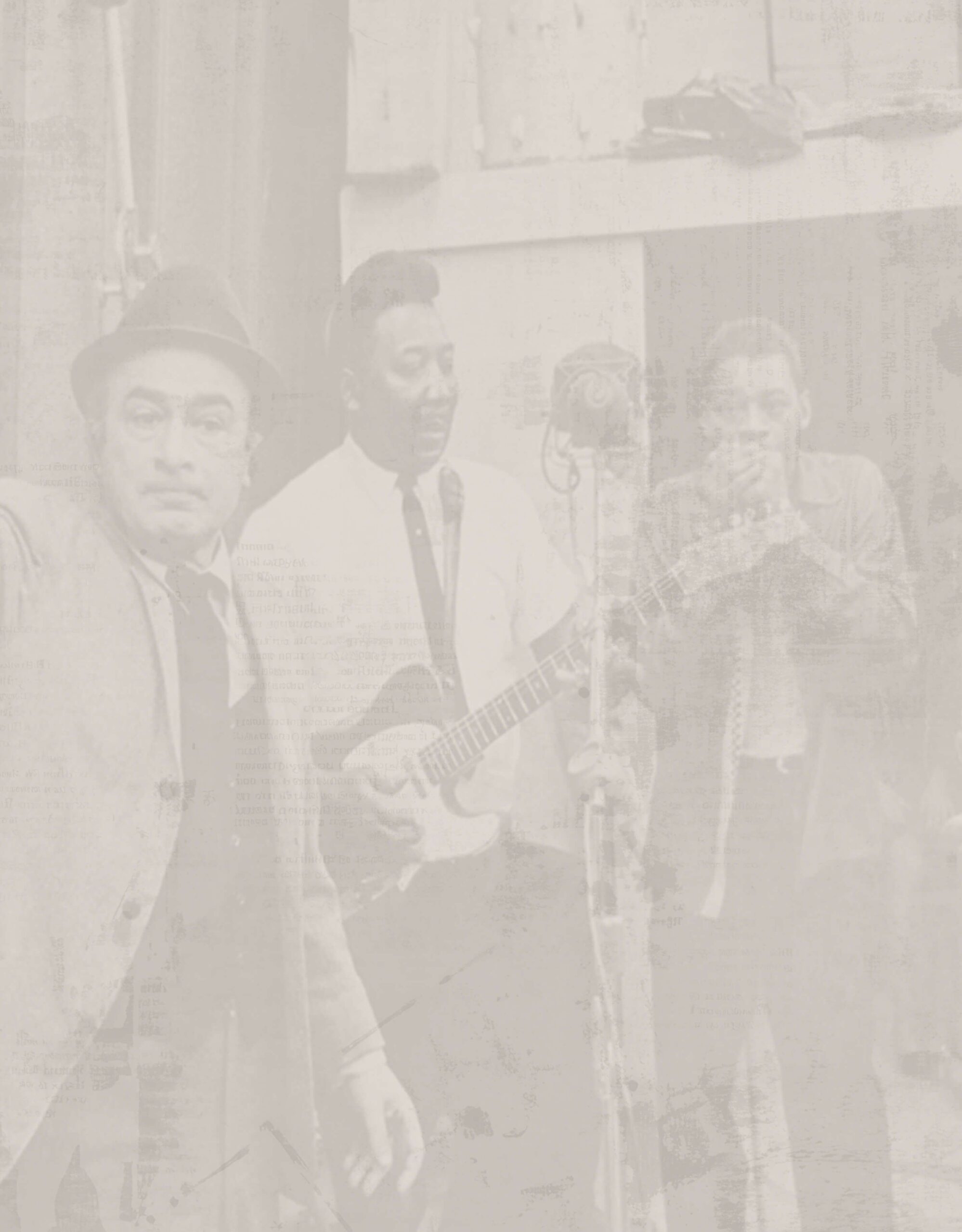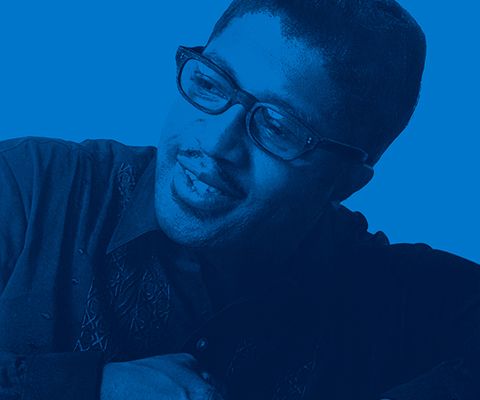Bo Diddley
Bo Diddley
“Watching Bo Diddley was university for me.” - Keith Richards, The Rolling Stones
What does it take to change the course of music history? Bo Diddley did it without a single note - his secret weapon was a five-beat, syncopated rhythm, rooted in Black musical traditions and forming the foundation for much of the last eight decades of popular song. Bo’s curiosity and innovation as a guitarist galvanized generations who picked up instruments in his wake, nearly all of whom would find Diddley holding the door open for them to walk through.
He was born Elias Otha Bates in 1928 and raised in McComb, Mississippi - the only child of a sharecropper’s teenaged daughter and a man he never met. His mother’s cousin, Gussie McDaniel, would raise him, and he in turn took her last name. After moving to the south side of Chicago as a boy, McDaniel made his musical proficiency known, playing violin in a Baptist church orchestra until he turned 18. Inspired by the music he’d hear in nearby Pentecostal churches - alternately frenzied and trancelike - he’d soon switch to guitar, playing on local street corners with other musicians.
Although no one agrees when and how Elias McDaniel became “Bo Diddley,” he was known by that name to patrons of the 708 Club, where he earned a regular headlining spot. He’d title his most famous composition by that name, too: a one-chord, hip-swaying jam with that irrepressible beat, a variation on the three-and-two clave rhythm of Afro-Cuban music that can be traced even further back to the west African folk style of Yoruba. “Bo Diddley” and the searing blues number “I’m a Man” were the first two tracks he recorded as demos, later finessing them for the sides of his 1955 debut single, a No. 1 R&B hit for Chess subsidiary label Checker.
Diddley’s bid for mainstream success threatened to end before it really started, thanks to some backstage drama at his debut appearance on The Ed Sullivan Show in 1955. The famed emcee had caught a set of Bo’s at The Apollo in New York City and liked what he heard, asking him to play the folk standard “Sixteen Tons” after hearing him sing it in rehearsal. Midway through the broadcast, however, Diddley realized audiences would be expecting “Bo Diddley,” and thus gave America the first televised performance of a rock and roll song. Sullivan felt betrayed by the switch and banned him from ever appearing again.
Sullivan’s decision had little effect on Diddley’s influence. The following year, he’d score a major pop hit as a songwriter, co-writing “Love is Strange,” a smash hit for Mickey & Sylvia. Even as his singles enjoyed only fleeting success on the pop or soul charts - favorites like “Diddy Wah Diddy,” “Who Do You Love” and “Hey! Bo Diddley” never charted at all, and “Say Man” settled into the pop Top 20 in 1959 - it was clear that Bo Diddley’s influence couldn’t merely be measured by sales sheets. Moving from Chicago to Washington, D.C., Diddley constructed his own home studio, perfecting everything from his distinctive, rectangular-bodied Gretsch guitar to the unique reverb and tremolo effects he’d inspire others to add to their playing. While in the nation’s capital, Diddley would also mentor a vocal group called The Marquees; although Chess passed on signing them, the guitarist would convince labelmate Harvey Fuqua to incorporate The Marquees into a revived version of his group The Moonglows, giving a career boost to Marquees frontman Marvin Gaye.
Never content to rest on his laurels, Diddley spent the rest of his life earning his flowers as an elder statesman of blues and rock and roll. He shared stages with everyone from The Rolling Stones to The Grateful Dead and The Clash. He made a memorable appearance in a 1989 Nike commercial alongside sports legend Bo Jackson. Honors included a 1987 induction into the Rock and Roll Hall of Fame, a Grammy Lifetime Achievement Award in 1998, three songs in the Grammy Hall of Fame (“Bo Diddley” in 1998, “Who Do You Love” in 2010 and “I’m a Man” in 2020) and both sides of his first single enshrined in the Library of Congress’ National Recording Registry in 2011. Though Diddley died in 2008, his beat literally goes on: it’s heard in rock radio staples by Buddy Holly, Elvis Presley, The Who, David Bowie, Tom Petty and The Heartbreakers, George Michael and U2.
What does it take to change the course of music history? Bo Diddley did it without a single note - his secret weapon was a five-beat, syncopated rhythm, rooted in Black musical traditions and forming the foundation for much of the last eight decades of popular song. Bo’s curiosity and innovation as a guitarist galvanized generations who picked up instruments in his wake, nearly all of whom would find Diddley holding the door open for them to walk through.
He was born Elias Otha Bates in 1928 and raised in McComb, Mississippi - the only child of a sharecropper’s teenaged daughter and a man he never met. His mother’s cousin, Gussie McDaniel, would raise him, and he in turn took her last name. After moving to the south side of Chicago as a boy, McDaniel made his musical proficiency known, playing violin in a Baptist church orchestra until he turned 18. Inspired by the music he’d hear in nearby Pentecostal churches - alternately frenzied and trancelike - he’d soon switch to guitar, playing on local street corners with other musicians.
Although no one agrees when and how Elias McDaniel became “Bo Diddley,” he was known by that name to patrons of the 708 Club, where he earned a regular headlining spot. He’d title his most famous composition by that name, too: a one-chord, hip-swaying jam with that irrepressible beat, a variation on the three-and-two clave rhythm of Afro-Cuban music that can be traced even further back to the west African folk style of Yoruba. “Bo Diddley” and the searing blues number “I’m a Man” were the first two tracks he recorded as demos, later finessing them for the sides of his 1955 debut single, a No. 1 R&B hit for Chess subsidiary label Checker.
Diddley’s bid for mainstream success threatened to end before it really started, thanks to some backstage drama at his debut appearance on The Ed Sullivan Show in 1955. The famed emcee had caught a set of Bo’s at The Apollo in New York City and liked what he heard, asking him to play the folk standard “Sixteen Tons” after hearing him sing it in rehearsal. Midway through the broadcast, however, Diddley realized audiences would be expecting “Bo Diddley,” and thus gave America the first televised performance of a rock and roll song. Sullivan felt betrayed by the switch and banned him from ever appearing again.
Sullivan’s decision had little effect on Diddley’s influence. The following year, he’d score a major pop hit as a songwriter, co-writing “Love is Strange,” a smash hit for Mickey & Sylvia. Even as his singles enjoyed only fleeting success on the pop or soul charts - favorites like “Diddy Wah Diddy,” “Who Do You Love” and “Hey! Bo Diddley” never charted at all, and “Say Man” settled into the pop Top 20 in 1959 - it was clear that Bo Diddley’s influence couldn’t merely be measured by sales sheets. Moving from Chicago to Washington, D.C., Diddley constructed his own home studio, perfecting everything from his distinctive, rectangular-bodied Gretsch guitar to the unique reverb and tremolo effects he’d inspire others to add to their playing. While in the nation’s capital, Diddley would also mentor a vocal group called The Marquees; although Chess passed on signing them, the guitarist would convince labelmate Harvey Fuqua to incorporate The Marquees into a revived version of his group The Moonglows, giving a career boost to Marquees frontman Marvin Gaye.
Never content to rest on his laurels, Diddley spent the rest of his life earning his flowers as an elder statesman of blues and rock and roll. He shared stages with everyone from The Rolling Stones to The Grateful Dead and The Clash. He made a memorable appearance in a 1989 Nike commercial alongside sports legend Bo Jackson. Honors included a 1987 induction into the Rock and Roll Hall of Fame, a Grammy Lifetime Achievement Award in 1998, three songs in the Grammy Hall of Fame (“Bo Diddley” in 1998, “Who Do You Love” in 2010 and “I’m a Man” in 2020) and both sides of his first single enshrined in the Library of Congress’ National Recording Registry in 2011. Though Diddley died in 2008, his beat literally goes on: it’s heard in rock radio staples by Buddy Holly, Elvis Presley, The Who, David Bowie, Tom Petty and The Heartbreakers, George Michael and U2.


